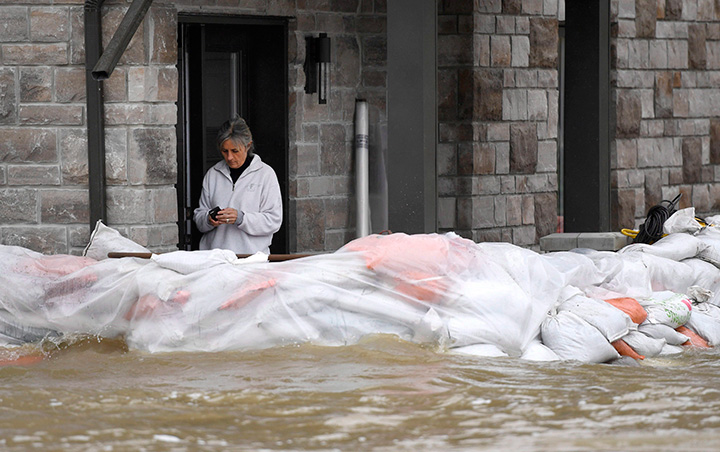Floods are a messy business.

As water levels rose across Ontario and Quebec this spring, everything from cars to basements ended up underwater in spite of the valiant efforts of volunteers and residents to save their property.
One of the oldest and most common lines of defence against flooding is sandbagging, and over the last several weeks, hundreds of thousands of plastic bags filled with sand have been distributed.
Now, as the flood waters begin to drop, residents and municipalities are facing a major clean-up. And one of the first questions being asked is: what to do with all those bags?
“We will take care of picking up the bags,” explained Yves Melançon, spokesperson for the hard-hit city of Gatineau, where over 350,000 have been distributed.
WATCH: Trudeau, Couillard take helicopter tour over flooded areas of Quebec

Residents are being advised not to use the sand on their property, as it may have come into contact with sewage or other contaminants. The bags, similarly, shouldn’t be re-used. Just leave them where they are for now, Melançon advised.
Within the month, once the water fully recedes, a major volunteer operation will get underway. The city says it will need able-bodied adults (16 and older) to help collect the filled sandbags.
IN PHOTOS: Dramatic images capture devastating floods from coast to coast
The bags themselves will likely end up at the dump, but the sand inside may be re-used where possible in roadworks and other industrial activities. Gatineau’s sand won’t be used in playgrounds, parks or other public spaces, Melançon said, because of the threat of contamination.
Over on the other side of the river in Ottawa, municipal officials say a plan is still taking shape for the collection and disposal of the bags. They expect to announce details in the coming days.
Don’t dump
One thing is being made crystal clear, however: nobody should be dumping sand into nearby waterways as a means of disposal.
“Absolutely don’t dump them in the river,” said Ottawa riverkeeper Meredith Brown. “Work with your municipality. They’re all going to have places that they’ll be picked up or taken away.”
As riverkeeper, Brown works to protect, promote and improve the health of the Ottawa River and its tributaries.
“All that sand in the river — right now as the river is high it’ll get transported around — but it’s all going to land somewhere.”
The sand could smother wildlife habitats or freshly laid fish eggs, for instance. It’s actually illegal to put sand in the river and on the flood plain without a permit, she pointed out.
WATCH: ‘Kayaking … that’s the only way to get out of here’ says resident

Brown said right now, however, one of her biggest concerns is sewage.
“We already know that there’s been probably millions of litres of untreated sewage that have gone into the river over the past couple of weeks,” she said.
“We’re really feeling for the people who have lost their properties or their houses have been inundated, but in a lot of rural areas there’s lots of septic fields that have been flooded.”
Marinas have also been inundated, and gas tanks, cars and various debris has simply floated into the river system.
“It’s really huge, there’s a lot of pollution going into the river right now that’s going to have to be dealt with over the next month or two.”


Comments